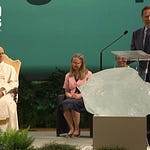In this episode of Wicked Problems - Climate Tech Conversations, host Richard Delevan sits down with Walburga Hemetsberger, CEO of SolarPower Europe, to delve into the transformative potential and current challenges of solar power in Europe. The conversation spans the explosive growth of solar installations, the strategic goals of SolarPower Europe, and the imperative need for a flexibility revolution in energy systems.
Solar Power Growth and Impact: The discussion begins with an exploration of the remarkable growth in solar installations in Europe, with over 100 gigawatts added in the last two years alone. Walburga explains the multifaceted factors driving this growth, including plummeting costs of solar modules and the versatile applications of solar technology, from large-scale plants to residential rooftops and even agricultural settings.
Manufacturing and Innov…













